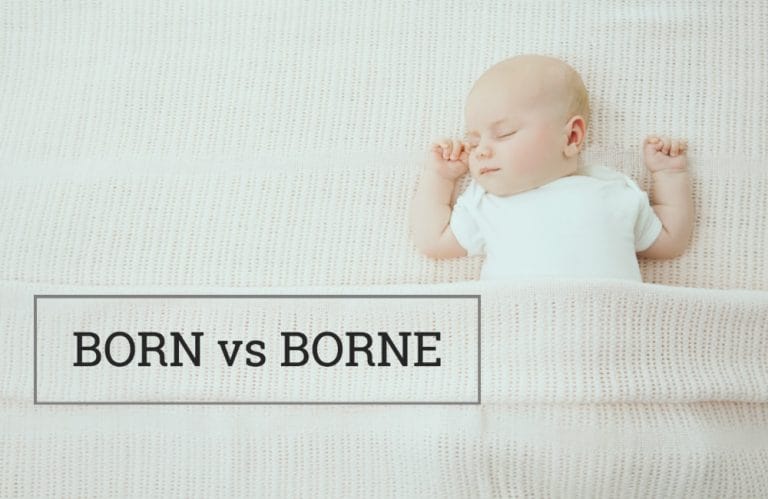Birth or Burden: Understanding 'Born' and 'Borne difference

In English, there are words that sound alike but mean different things, which can be confusing. A common mix-up for many Indian learners is between "Born" and "Borne". Though they sound the same, their meanings and uses are different.
Knowing how to use "born" and "borne" correctly is important for clear English communication. Using them wrong can change what you're trying to say and cause confusion!
This article will explain "born vs borne", how to use them right with examples, and tips to avoid mistakes. Let's get into the difference between "born" and "borne" and learn to use them properly!
Understanding 'Born'
'Born' is a common term in English that denotes the start or origin of something or someone. It typically refers to when a person or creature comes into existence. Usually by being given birth to by their mother.
Let's explore some contexts where 'Born' is used:
Birth of a human: "I was born in Mumbai."
Origin of an idea: "A new plan was born during the brainstorming session."
Start of something significant: "A star was born when he scored a century at the cricket match."
Non-native speakers often confuse 'born' with other similar-sounding words like 'borne'. For example, they might incorrectly write, "The burden was born by him." Instead of the correct use, "The burden was borne by him." To avoid such mistakes, remember that 'born' is primarily associated with birth or beginning.
Here is a simple comparison table:
Incorrect Usage | Correction |
The burden was born by him. | The burden was borne by him. |
She was borne in 1990. | She was born in 1990. |
For more examples of common mistakes in English, you can refer to the Clapingo blog posts.
Exploring 'Borne'
'Borne', on the other hand, is a word that means carrying or spreading something. It's often used when talking about diseases and burdens.
Here are some contexts where 'Borne' is used:
Carrying responsibility: "The cost has been borne by the company."
Spreading diseases: "Malaria is a mosquito-borne disease."
Here's a quick comparison:
Wrong Usage | Right Usage |
He was borne in Kolkata. | He was born in Kolkata. |
A new idea was borne. | A new idea was born. |
Still confused about language errors? Check out the helpful Clapingo YouTube channel.
Born Vs Borne – Spotting The Differences
The terms 'Born' and 'Borne' often cause confusion among English learners. Let's understand their differences in a simple way.
Born | Borne | |
Use | Refers to the birth of a living being. | Used to denote carrying or spreading something. |
Example | She was born in Kolkata. | The news was borne across the globe swiftly. |
Here's the reason that often causes confusion. 'Bear' is a verb with multiple meanings. It can mean to hold or support, to tolerate or endure something, or even to produce fruit! When you transform 'bear' into past participle for the first two meanings (holding/supporting and tolerating), it becomes 'borne'. However, when referring to birth (third meaning - producing), it becomes 'born'.
Let's illustrate this with examples:
The tree has borne fruits this summer (referring to production).
She has borne the pain silently for years (referring to tolerance).
He was born on a rainy day (referring to birth).
Practical Exercises for Mastering ‘Born’ and ‘Borne’

Here are two simple exercises to help you distinguish between 'born' and 'borne':
A: Fill in the blanks with 'born' or 'borne':
The baby was _____ on 15th August.
The swan gracefully _____ its weight on the calm lake.
He has always _____ the burden of responsibility.
Answers:
Born: We use 'born' when referring to birth.
Borne: Here, 'borne' refers to carrying or supporting something, in this case, the swan's weight.
Borne: Again, 'borne' is used when referring to carrying something, here figuratively referring to responsibility.
B: Correct the usage of born/borne in the following sentences:
The evidence borne out her innocence.
The aircraft has born off course due to strong winds.
Answers:
Bore instead of borne. As it is past tense we use bore instead of borne.
Borne instead of born. Here, we're talking about carrying or moving something (the aircraft).
How Clapingo Can Help You Master English Usage
Understanding the difference between 'born' and 'borne' might seem hard, but Clapingo is here to help make your English learning easier. With one-on-one coaching from native speakers, Clapingo teaches these difficult parts of English in a friendly way.
Clapingo offers various plans to fit your level, whether you're just starting or already know some English. Imagine not being sure which word to use in a work email. Clapingo's coaching means you won't have to worry about that anymore. Practising regularly with native speakers will make you sure about using 'born' and 'borne', helping you speak and write English confidently in any situation. You can book a quick trial to see if Clapingo is the best fit for you.
To Recap
Let's review what we've learned about "Born vs Borne." The main difference is how they're used:
"Born" refers to birth, like in "He was born in Delhi."
"Borne" means carried or spread, such as "The disease was borne by mosquitoes."
Don't worry about these small mix-ups stopping you from learning English. Picking up a new language is tough but possible with regular practice and effort. If you're ever confused about English concepts or rules, look them up, practice, and ask questions when needed.
For extra help, consider using services like Clapingo, which provides learning programs designed for non-native English speakers.
FAQs
1. What is the difference between born and borne?
The key difference between 'born' and 'borne' lies in their usage. 'Born' is specifically used in the context of birth. For example, "She was born in Chennai."
'Borne' is used to convey the meaning of carrying or spreading. For example, "The cost will be borne by the company."
2. Can I use ‘Borne’ in place of ‘Born’?
Grammatically speaking, no. The term 'borne' should not replace 'born' as they hold different meanings and contexts. Misusing them could lead to confusion. Remember the tip: 'born' for birth, and 'borne' for bearing or carrying.
3. Which form of ‘bear’ should I use after a preposition?
After a preposition, always use the '-ing' form – 'bearing'. Example: "They went into the jungle, bearing gifts for the tribal chief."
Comments
Your comment has been submitted